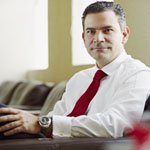By putting people above processes, Twitter HR director Brandy Contreras is helping the social media start-up become a global communications empire
Before it was something you could read on your computer, tablet, or smartphone, a “tweet” was a melodious trill heard flitting through the treetops, passed between the beaks of prattling birds. Now, it’s a written message of 140 characters or less that’s broadcast from individuals to their “followers” via the communications platform Twitter. More than a chirp, therefore, a tweet is a phenomenon. And yet, its avian origins remain, as Twitter Inc. has more than 1,000 employees in 11 offices around the world, all of who function like a flock. Flying in formation, they’re leading more than 500 million Twitter users across the digital landscape into a new era of real-time communication.
Alongside vice president of human resources Janet Van Huysse, leading the flock’s HR team is HR director Brandy Contreras, who is building Twitter’s international infrastructure as the company continues its global expansion. She recently spoke with Hispanic Executive about social media, human resources, and her efforts to help make Twitter an enduring global brand—from the inside out.
Few kids dream of working in HR. How did you get interested in this field?
That was all due to my mentor, Abby Areinoff. She was the first person I worked for after graduating from college. I was her secretary and she was the senior attorney in contracts at Walt Disney Animation Studios, which was part of the HR department. Until working for her, I had no idea how exciting and challenging an HR role could be. I honestly thought it was just the payroll department and “principal’s office.” She opened my eyes to an amazing new world and I was hooked from then on.
3 Tips
1.
When employees want to get involved, you should not only let them, but reward them.
2.
It’s not enough to say something is important without consistently demonstrating it in actions. And the first place people look for that demonstration is up. They look to see how their leaders act, and take their cues from them.
3.
Don’t get mired down in the situation most companies find themselves in, which is policing employees to within an inch of their lives. It causes resentment and creates a very paternalistic environment. Instead, be open and honest.
How did you end up at Twitter?
As I mentioned, my first job out of college was as a secretary at Disney. I was there from 1997 until 2006. Then, Abby Areinoff—who at the time was senior vice president of worldwide HR for Sony Pictures—called me up about an opportunity as the HR director for its TV International division. I was at Sony for about nine months. Then I went back to Disney from 2007 until 2011. Disney is an amazing company, but for the first time in my life I was getting restless about having only ever lived in Los Angeles. I was looking for a new kind of challenge. That’s when I saw the job at Twitter in San Francisco. Once I met Janet Van Huysse, we clicked instantly and the rest is, as they say, history.
How does HR function in a company as unique as Twitter?
HR does an incredible amount of change management and coaching leaders on how to think through scaling questions. As a start-up grows, you find that certain things that worked as a small company have to evolve—and that can cause a lot of anxiety. So, in a word, an HR person at Twitter builds. We build processes that can successfully scale. We build an amazing team that will take us to the next phase of our company growth. We build trust with our partners, employees, and leadership in the organization. We help build a sustainable culture that is as unique, inspirational, influential, and amazing as our product. And, if we’re doing it right, we build the future of HR.
Describe your HR “philosophy.”
In my opinion, HR is about how we as a support group can empower our organization to make the right decisions and treat each other in a way that we can all be proud of. It isn’t about control. Instead, it’s about setting up programs that echo the core values of the company. It’s about setting up guidelines for the 90 percent of people you assume will do the right thing rather than policing things for the 10 percent you assume won’t. It’s about treating everyone like intelligent adults and being open and honest with them about our decisions rather than hiding behind policy or regulations.
You went to law school. How does your legal background help you in HR?
Having a legal background has helped to round out my perspective. It has helped me readily look for the root cause of an issue rather than the obvious symptom. It has also taught me to be more creative. When you study law, you learn to think on your feet and work through ever-changing hypothetical situations very quickly. I think this is very relevant in HR.
Twitter is growing globally. What’s your role in its expansion?
Twitter’s international expansion is actually the focus of my job now. We are currently focusing on what the organizational structure, recruiting efforts, HR philosophies, practices, and programs will be in different countries around the world.
What HR challenges and opportunities does international expansion present?
It is always difficult to maintain a “connected” environment when employees are all over the world, so it needs to be a priority. Finding the right technology to make the connectivity easier is key, but it’s also about having the right mind-set. My goal is to make sure that people are cognizant of how far their team extends and always think about the remote folks, whether it’s something as simple as scheduling a meeting or something as complex as deciding to roll out a program.
What values from your personal background have shaped your career?
We’re a typical tight-knit Mexican-American family. I was very fortunate to never want for anything growing up, but I also understood the value of hard work. My mom always worked two and three jobs to raise us. She was such a shining example of having an incredibly strong work ethic. My dad was the poster child for connecting with people and cultivating relationships. He was always networking wherever he went and developing strong connections. I have taken those bits from each of them and have been successful because of those qualities.
Working for a start-up is notoriously demanding. How do you maintain work/life balance?
One of the great things I have learned about the start-up world is that it’s not about balance. It’s about boundaries. I have to credit Janet with that kernel of wisdom. I have so much passion for what I do and for Twitter that it is easy to get lost in it. So, I have taken that advice and created boundaries for myself about when I will stop e-mail, when I will disconnect from the computer, when I will be unavailable, and when I need time off.
What’s your advice to young Latino/as as they pursue careers in and outside of HR?
The most important thing is that you love what you do. I feel that nothing is worth your time if you can’t be passionate about it. I wholeheartedly believe that if you are doing something you love, you will never have to work a day in your life. I was lucky that I got to stop working several years ago when I became an HR director.

